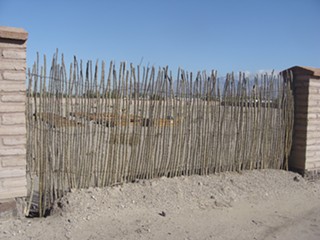When Josefina Cardenas describes the desert between the Santa Cruz River and the base of Sentinel Peak ("A" Mountain), she links her hands together and rocks them as if she's cradling a baby.
From the east side of the riverbed, at Verdugo Park, Cardenas looks at the land and describes it as a cuna, because it's shaped like a cradle.
This is Tucson's birthplace—Chuk Shon, a swath of desert that connects the history of the Hohokam and the Tohono O'odham, Father Kino's arrival with the Spanish, and then the Mexicanos. It's now home to many Chicano families that have lived in the surrounding neighborhoods for more than five generations.
Cardenas was raised in what was once called Barrio Santa Cruz and is now part of Barrio Kroeger Lane. She says many of her neighbors are tied to the land and its history—some still raise horses, goats, cows and chickens on small ranches that have been in their families for multiple generations.
On Oct. 18, the state-appointed Rio Nuevo board voted to file a lawsuit against the city of Tucson for $47 million—plus the Chuk Shon property, which includes an area across the Santa Cruz River from Verdugo Park, and the Mission Garden. (For more on the Mission Garden, see "Garden Revolution!".)
Cardenas has had enough.
"In 1999, we, the voters, approved Rio Nuevo, which included a vision the neighbors and the city had for this area," Cardenas explains, looking at part of the property from a picnic table in Verdugo Park.
"The idea was to celebrate history, to help Tucson remember where it came from. This was a land where the Hohokam first farmed. Father Kino mentions stopping by here in his diary while riding on horseback. This is our history."
Since the lawsuit was announced, Cardenas and a group of activists—including representatives from Derechos Humanos, Pan Left and other groups—formed Protect Chuk Shon. Its mission is to make sure the property remains with the city and county, and that part of it is protected from private development.
According to Jason Aragón, a Pan Left activist and documentary filmmaker, the coalition is a good way to not only protect the Chuk Shon property, but to also call attention to issues he and others have with the Rio Nuevo board and the Legislature.
"This isn't a board you and I elected," Aragón says. "This is a board appointed by the state to make decisions in our community using our money."
Aragón also points out that some members of the Rio Nuevo board have supported state laws that are contrary to the spirit of Tucson—including SB 1070 and the anti-Mexican-American-studies law, HB 2281. The board includes former state Sen. Jonathan Paton; chairwoman Jodi Bain, an attorney with Munger Chadwick; and Republican mayoral candidate Rick Grinnell, a lobbyist for Rosemont Copper.
On Saturday, Nov. 12, Aragón, Cardenas and other activists will rally near the Chuk Shon property. It starts with a buffelgrass pull at 7 a.m. at the end of the Santa Cruz River Park trail, off Mission Road north of Star Pass Boulevard. That will be followed by a ceremonial blessing and a procession to Verdugo Park, on the other side of the Santa Cruz, where 19th Street ends at Verdugo Avenue.
The rally culminates at noon with workshops, music and food. For more information, search for "Rio Nuestro-Protect Chuk Shon" on Facebook.
"This is only the beginning. We need to use this as a chance to organize as a community and say, 'Enough is enough,'" Aragón says. "Many of us do so much on our own with our different affiliations, but here, we will get to know one another, and (will get) the neighbors to work together. I think there's a feeling that there's something going on right now here in Tucson and in the world. People are tired and motivated to act."
When the Rio Nuevo board voted to file the lawsuit, it also decided to allow a 120-day period before serving the claim against the city to give time for mediation.
"I am not just going to sit and wait to see what happens," says Regina Romero, the Tucson City Council member for Ward 1, which includes the Chuk Shon area. "That's why I am glad that Protect Chuk Shon formed and that people are standing up and saying, 'No.'"
Romero agrees with Aragón that the Rio Nuevo board may not have the best interests of Tucson at heart. "This was voted on by the people in 1999, to create a heritage park. That's what voters want to see out there," she says.
Romero says she hasn't heard of any developers waiting in the wings to build at Chuk Shon. But if the land were ever taken and sold to developers, she says it could spark gentrification that would forever change the character of neighborhoods like Barrio Kroeger Lane.
"It is ludicrous for the state-appointed Rio Nuevo board to sue Tucson with its own (tax-increment financing) taxpayer money," Romero says. "And on top of that, they want the land."
The property includes Mission Garden, which was part of the original Rio Nuevo heritage-park proposal that re-creates Father Kino's mission farm. Romero has been a steady advocate for Mission Garden, now also supported by Friends of Tucson's Birthplace, which has raised more than $100,000 for trees and a water system.
The city is under fire from the Rio Nuevo board because it has spent $230 million without much to show for it.
"In 1999, we in this neighborhood believed in Rio Nuevo," Cardenas says. "I hope and want the Rio Nuevo board to open their minds and their hearts. This isn't just any other property. This is where we come from."












